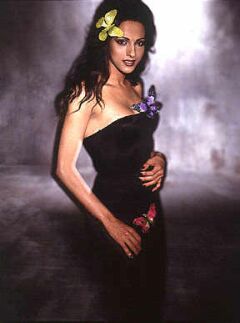Yaron
Cohen was born in 1972 in Tel Aviv (Israel).
He
was the youngest of three children
(Dana
has an older sister, Limor
and
an older brother, Nimrod)
of
a Yemenite working family.
He
studied elementary school and then
went
the 'Ironi Alef' High school, where he met two brothers
(Lior
and Schmulick Sa'adia)
who
would become her dancers.
His
favourite subjects where English and History.
Yaron
early realized he belonged to stage.
He
liked the Eurovision Contest and followed it,
especially
when recently died Ofra Haza
(who
had yemenite roots as Dana)
represented
Israel with the song "Hi".
That
day he swore himself that he would be there,
on
that stage, someday.
But
it wasn't he, but she, who went up to stages
showing
his feminine voice and superb singing skills
as
a drag in gay clubs where the 27-years-old DJ
(now
her personal agent) Ofer Nissim mixed.
He wasn't accepted
by ultra-othodox Jews,
that claim that beign
gay must be punished.
Despite this, he had
a huge success and was popular.
Dana's
first hit was the song "My name's
not Sa'ida".
It
was a lampooning cover version of
Whitney
Houston's song "My name's not Susan"
It
was listened on radio stations over and over again.
People
loved her.
Then, in 1993 and in
hiding of friends and family,
Yaron flew to London
and came back
as Sharon Cohen, after
the
gender reassignment surgery.
That
same year she released her first album
in
Israel, although it soon went out to other Middle-West
countries
such as Egypt and Jordan.
It
was called like one of her songs,
the
one from which she took her name.
"Danna
International" soon became gold in Israel.
Later
came her second album, "Umpatampa",
and
she was awarded Best Female Artist in Israel in 1996.
But
for israeli ultra-orthodoxs she still was he.
(NOTE:
After this album, her company released
a
CD with remixes and some new songs, called "EPTampa").
In
1995 she tried to make it for the ESC
and
entered Israeli Pre-Eurovision Selection (KDAM).
She
ended 2nd, with the feeling that her friends
were
right when saying that people
would
never vote a transsexual to represent their country.
It
was (and still is) a very conservative and narrow-minded
country
that socially bans gay and transsexuals.
"Maganona"
(which means "Crazy" in Arab) was an answer
to
Dana's Egyptian and arab-speaking audience.
In
Egypt, her music had been censored,
but
five millions illegal copies were sold,
without
Dana earning a single cent.
But
in 1998 her dream finally came true.
She
was selected by an IBC (Israeli Broadcasting Company)
comission
to represent the country in that year's ESC.
When
it was known in Europe that she was a TS,
she
soon attracted the media attention.
Jean-Paul
Gaultier got in touch with her
to
design the dress she should wear during the performance
of
the properly called song 'Diva'
(although
she eventually decided to wear another one
and
leave Gaultier's for the final victory performance).
The
Contest was held May 9th in Birmingham Wembley Arena.
That
year a change was introduced and people could
vote
for her by phone, and there would not be
judges
to choose who to send the points to.
Maybe
that was the reason she won.
Although
she knows how to sing and move onstage,
all
the media attention and the fight of gays
to
turn her into their icon could have overlapped that fact.
She became famous
everywhere, and she was the first
Israeli artist to
be interviewed on MTV.
Everyone wanted her
to be on their TV shows
in maximum audience
hours.
After
her winning, she released two albums with her best songs,
one
that fit in her country's market ("Diva
Ha-Osef") and
another which fit
in European market ("The
Album" ).
This last one used
songs that Dana International
and her management
didn't allow to use,
so she took POLYDOR
to courts and won the trial.
After
sometime away the public eye, her awaited
first
international album "Free"
was released in Spring 1999.









